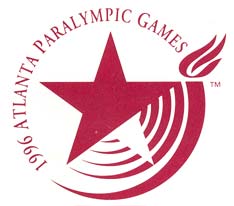

First held in Rome in 1960 with 400 athletes from 23 countries, the Paralympic Games will hld its tenth competition in Atlanta, August 16-27, 1996. This will be the United States' first ever Paralympic Games held in the same city as the Olympic Games.
Atlanta will host 4,000 athletes representing 102 nations for 10 days of competition. "The Paralympics are now viewed as a world class sporting event," notes Mike Mushett, Senior Vice President of Sports and Operations for the Atlanta Paralympic Organizing Committee (APOC). "The games in Atlanta will be the single most important sporting event ever held for individuals with physical disabilities."
The Paralympics have scheduled 17 medal sports along with two demonstration sports (sailing and racquetball). The games are second only to the Olympic Games in size, scope, and complexity. APOC will coordiante the logistics of 1,000 coaches, 1,500 officials, and 15,000 volunteers.
Atlanta follows in the footsteps of the great cities of Seoul and Barcelona that staged world-class Paralympic Games. The 1992 Paralympic Games in Barcelona were a watershed event; they attracted more than 1.5 million spectators and almost 25% of the various events were sold out.
But will American attend the Xth Paralympics and will the games be a financial success? Wayne Minshew, Project Directory for Communications and Creative Service of APOC, believes they will. Minshew projects that "the average person who cannot afford to attend the Olympics will be able to sample the 'Olympic experience' by attending the Paralympics. The Paralympics will provide the same atmostphere, use the same venues, and attract world class athletes-- just as the Olympcis do."
However, APOC faces a number of formidable challenges to make the games a success. No U.S> city has ever hosted the Paralympic Games; therfore, no Amercain city can serve as a model to help assure Atlanta's success. Furhtermore, and unlike the Barcelona Paralympics where a Spanish foundation donated $45 million to stage and promote the games, no charity has stepped forward to pay the bill in Atlanta. According to the Wall Street Journal (December 10, 1993), the Paralympics are being touted more as corporate marketing vehicle that a charitable cause. Fund-raising efforts have forced the Olympic and Paralympic movements to fight over corporate sponsors and quarrel over the sale of licensed merchandise for the past two years.
To assure the success of the Paralympics, the ATlanta Committee for the Olympic Games (ACOG) and the United States Olympic Committee (USOC) reached an historic agreement recently with APOC which entails coordinating their respective groups' marketing of corporate sponsorships.
Under the arrangements, ACOG became the first sponsor of the Atlanta Paralympics with a commitment of $15 million cash and $10 million value-in-kind. The financial agreement assures, among other things, that Olympic and Paralympic organizers will work together to develop technology and systems to assure a smoot transition over the 12 days between the two events.
With the passage of the Amateur Sports Act of 1978 (PL 95-606), the USOC is to encourage and provide assistance to amateur athletic programs and competition for individuals with disabilities. Kirk Bauer, Executive Director of National Handicapped Sports, notes that "because of the corporate marketing agreement, the USOC has taken the next step-- that of becoming ginancially committed to treating the Paralympic team on an equal footing with the non-disabled Olympic team."
APOC needs to raise $100 million to fund the Paralympics. Fundraisers for APOC are soliciting $4 million to $6 million for each exclusive corporate sponsorship. Promoters are featuring the games as a way to build customer loyalty among America's estimated 43 million individuals with disabilities. The Committee so far has signed only three U.S. companies as full sponsors. Will there be others?
The Atlanta Paralympics could represent a major opportunity for corporations to capitalize on the business and social issues represented by the Games (Sports 'n Spokes, September/October, 1993). G. Andrew Fleming, President and CEO of APOC, says "that most companies are slow to view the Paralympics as a serious business opportunity" (Wall Street Journal, December 10, 1993). Like the recent XV World Cup in soccer, the ultimate success of the Xth Paralympics will primarily depend upon: whether or not corporate America views sports for the disabled as a money making venture in the cutthroat business of sports, and whether mainstream America will attend the games exhibiting the same level of interest and support that was shown by fans in Seoul and Barcelona.